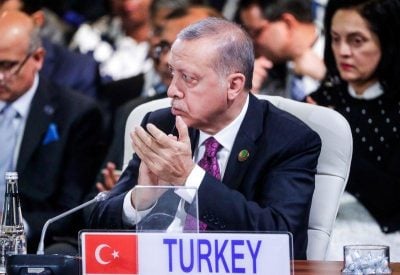Turkey’s Involvement in Nagorno-Karabakh

Wannabe sultan Erdogan’s involvement in Azerbaijan’s war on Armenia in Nagorno-Karabakh (NK below) is another example of his aim for greater regional influence and control.
In July and August, Turkey and Azerbaijan conducted joint ground and aerial military exercises, what they’ve done many times before.
Turkey reportedly kept F-16 warplanes in the country as a deterrent against possible Armenian attacks on its territory.
Have they been involved in Azeri NK fighting? Armenia claimed a Turkish warplane downed one of its own. Ankara and Baku deny involvement of Turkish warplanes in the conflict
Last week, Azerbaijan admitted using Turkish supplied weapons.
Erdogan expressed support for Azeris in NK, saying he’ll provide what they need to seize control of the enclave.
Along with supplying weapons, Turkish supported jihadists are involved in Syria, Libya, and NK.
If conflict escalates between Azerbaijan and Armenia to their territories, Russia — despite remaining neutral and seeking a halt in fighting — will be forced to aid Armenia militarily to fulfill its Collective Security Treaty Organization (CSTO) obligations.
That could draw the US and other Western countries into the conflict, escalating it dangerously — clearly what Russia wants avoided.
Military support by Turkey (along with Israeli supplied heavy weapons) for Azerbaijan risks escalation — the danger of a local conflict becoming a wider regional and international one.
Sharing borders with Armenia and Azerbaijan, Iran could get involved if fighting spreads to its territory, what Tehran very much wants avoided.
It has good relations with Ankara and has a large Azeri population.
Iran fosters regional peace, stability, and cooperative relations with other countries.
If it gets involved in the Armenian/Azeri conflict unavoidably in self-defense, it could give the US a pretext — under either wing of its war party — to strike Iran militarily.
Throughout years of US aggression in Syria, especially since Russia’s direct involvement for the past five years at the behest of Damascus, Moscow has gone all-out to avoid confrontation with Pentagon forces.
Sergey Lavrov is using his considerable negotiating skills to convince Armenia and Azerbaijan to halt fighting and resolve their longstanding differences diplomatically.
Turkey is a major obstacle to restoration of peace in NK because of its direct involvement in fighting.
US, NATO, and Israeli hardliners would very much like to draw Russia and Iran into the NK conflict directly, aiming to destabilize both countries.
In the case of Iran, it would be a pretext for US war on the country, what Israel has long sought.
If Russia is unable to convince Armenia and Azerbaijan to halt fighting in NK, it could escalates into a broader, much more serious conflict.
A Final Comment
On Monday, political analysts Maria Armoudian and Serj Tankian slammed Erdogan’s “neo-imperial ambitions” in the region, saying his involvement in NK “must be stopped,” adding:
Supporting Azerbaijan against Armenia in the enclave continues Turkish “terror that Armenians have suffered for more than a century” — including Ankara’s Armenia genocide, responsible for around 1.5 million deaths a century ago.
Azeri President Aliyev said he’ll only cease fighting if Armenians “leave our lands unconditionally, completely and immediately.”
Erdogan supports his agenda, saying “our Azerbaijani brothers are waiting for the day they will return to their land” — promoting conflict instead of urging resolution.
Turkey is a major internal and regional human rights abuser.
Erdogan has neo-Ottoman ambitions to extend his influence far beyond Turkey’s borders.
The US prioritizes endless wars over world peace and stability. Key NATO countries and Israel operate the same way.
Because of their imperial aims, the Middle East and Central Asia are powder kegs.
Conflict in NK that could escalate further made a hugely dangerous part of the world a potentially far more serious hot spot.
*
Note to readers: please click the share buttons below. Forward this article to your email lists. Crosspost on your blog site, internet forums. etc.
Award-winning author Stephen Lendman lives in Chicago. He can be reached at [email protected]. He is a Research Associate of the Centre for Research on Globalization (CRG)
His new book as editor and contributor is titled “Flashpoint in Ukraine: US Drive for Hegemony Risks WW III.”
http://www.claritypress.com/LendmanIII.html
Visit his blog site at sjlendman.blogspot.com.

